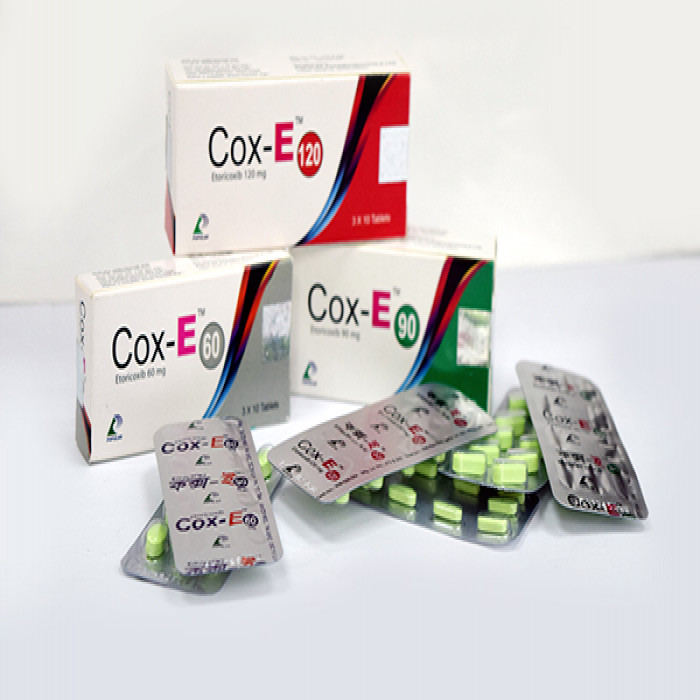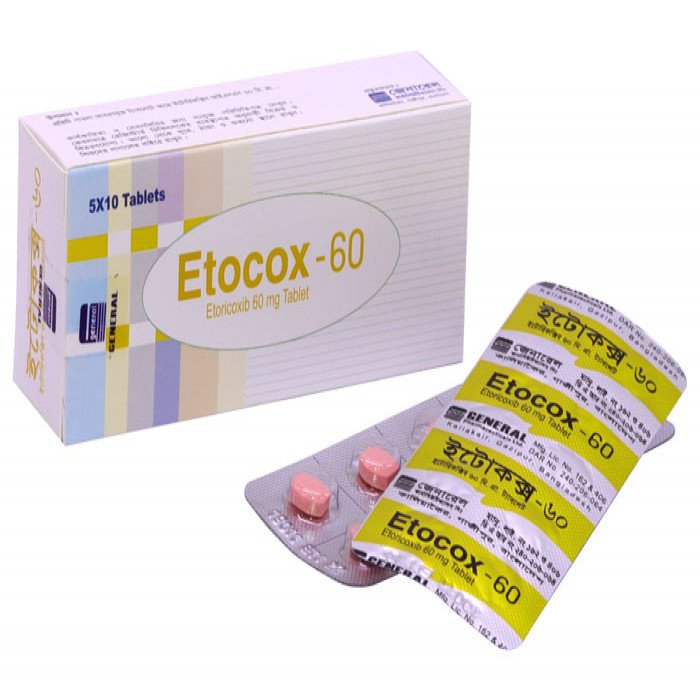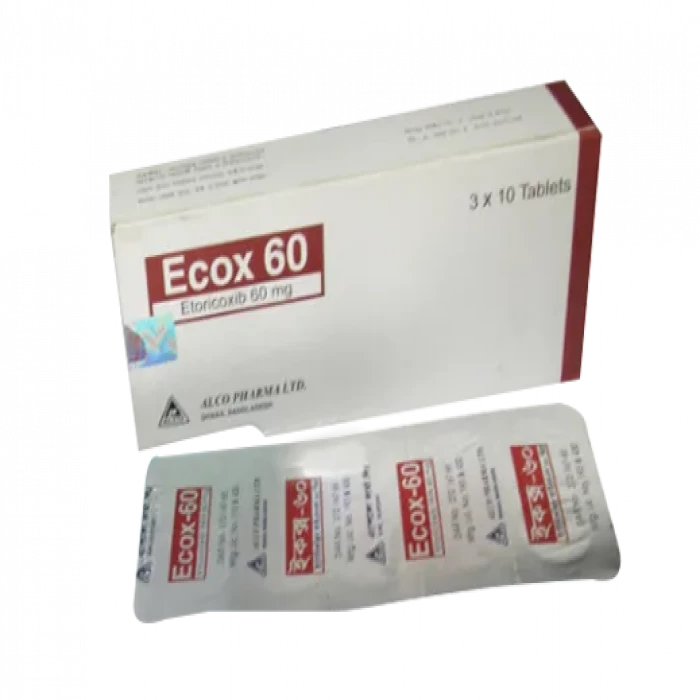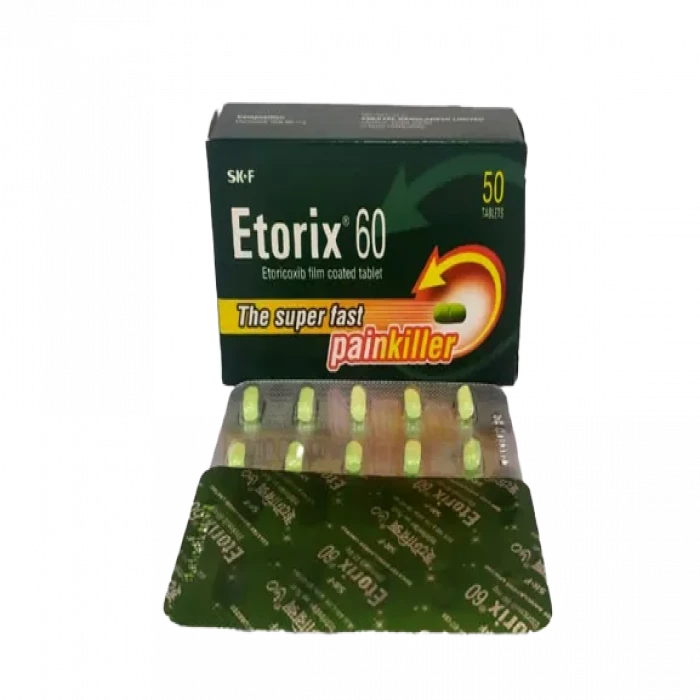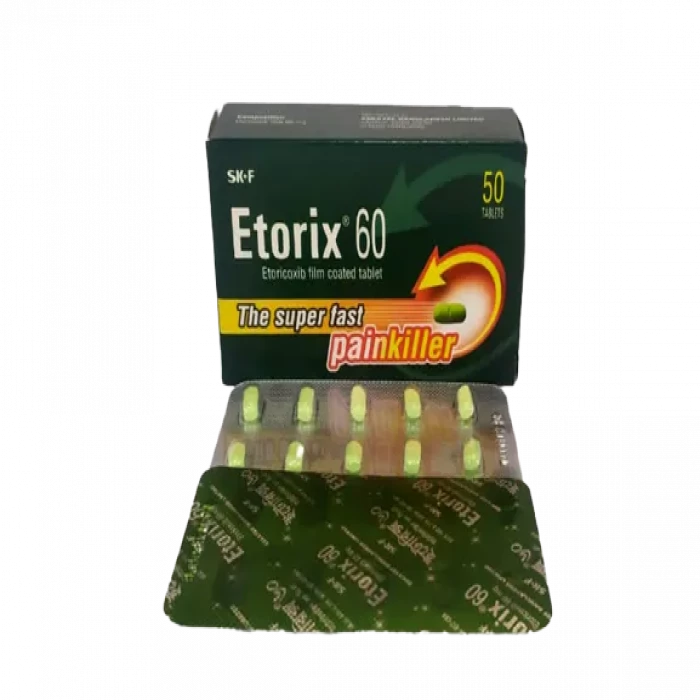
✔ 100% Authentic Product
👁️ Currently Viewing 3906
Generic Name: Etoricoxib 60mg
Manufacturer/Distributor: Eskayef Bangladesh Ltd.
Discount
Price: ৳ 67
MRP:
৳
70
5%
Off

100% Genuine Products, Guaranteed

Safe & Secure Payments, Always

Fast, Secure & Efficient Delivery

Proper Packaging
 Cash on Delivery - All over Bangladesh
Cash on Delivery - All over Bangladesh Regular Delivery - 12-24 Hours, Dhaka City* Charge Tk.39-59
Regular Delivery - 12-24 Hours, Dhaka City* Charge Tk.39-59 Regular Delivery - 24-48 Hours, Other Cities* Charge Tk.99-110
Regular Delivery - 24-48 Hours, Other Cities* Charge Tk.99-110
🌙 রমযান অফার 🌙
 ফ্রি ডেলিভারিঃ - ৭৯৯ টাকা+ অর্ডারে, ঢাকা
শহরে
ফ্রি ডেলিভারিঃ - ৭৯৯ টাকা+ অর্ডারে, ঢাকা
শহরে ফ্রি ডেলিভারিঃ - ২৭৯৯ টাকা+ অর্ডারে, ঢাকার
বাহিরে
ফ্রি ডেলিভারিঃ - ২৭৯৯ টাকা+ অর্ডারে, ঢাকার
বাহিরে
📲 মোবাইল অ্যাপ অর্ডারে সাশ্রয় বেশী
-
Google Play Store থেকে ডাউনলোড
-
Apple Store থেকে ডাউনলোড
100% Genuine Products, Guaranteed
Safe & Secure Payments, Always
Fast, Secure & Efficient Delivery
Proper Packaging
 Cash on Delivery - All over Bangladesh
Cash on Delivery - All over Bangladesh Regular Delivery - 12-24 Hours, Dhaka City* Charge Tk.39-59
Regular Delivery - 12-24 Hours, Dhaka City* Charge Tk.39-59 Regular Delivery - 24-48 Hours, Other Cities* Charge Tk.99-110
Regular Delivery - 24-48 Hours, Other Cities* Charge Tk.99-110 ফ্রি ডেলিভারিঃ - ৭৯৯ টাকা+ অর্ডারে, ঢাকা
শহরে
ফ্রি ডেলিভারিঃ - ৭৯৯ টাকা+ অর্ডারে, ঢাকা
শহরে ফ্রি ডেলিভারিঃ - ২৭৯৯ টাকা+ অর্ডারে, ঢাকার
বাহিরে
ফ্রি ডেলিভারিঃ - ২৭৯৯ টাকা+ অর্ডারে, ঢাকার
বাহিরে- Google Play Store থেকে ডাউনলোড
- Apple Store থেকে ডাউনলোড
🌙 রমযান অফার 🌙
📲 মোবাইল অ্যাপ অর্ডারে সাশ্রয় বেশী
Safety Advices

Alcohol

Breastfeeding

Pregnancy

Driving

Kidney

Liver
✔️ Uses of
✔️ Side Effects of
Common side effects include palpitations, fatigue, flu-like symptoms, and ecchymosis; less frequent side effects include mouth ulcers, dry mouth, taste disturbances, appetite changes, transient ischemic attacks, chest pain, flushing, coughing, dyspnea, epistaxis, anxiety, mental acuity impairment, paranesthesia, electrolyte disturbance, myalgia, and arthralgia; and very rarely confusion and hallucinations.
✔️ How to use
✔️ Indications
Etorix 60 is used to treat the symptoms of-
- relieving moderate pain and swelling of joints associated with different forms of gout and arthritis that affects the joints is called osteoarthritis (OA)
- Rheumatoid arthritis (RA), ankylosing spondylitis, and the discomfort and inflammatory signs and symptoms of acute gouty arthritis are examples of this type of arthritis.
- For the temporary treatment of moderate pain brought on after dental surgery.
✔️ Pharmacology
Etoricoxib is a potent, orally active COX-2 selective inhibitor when used within and much over the therapeutic dosage range. There are two isoforms of cyclooxygenase: cyclooxygenase-1 (COX-1) and cyclooxygenase-2 (COX-2) (COX-2). Gastric cryoprotection and platelet aggregation are two examples of typical physiologic processes that are mediated by prostaglandins and are controlled by COX-1. Inhibition of platelet aggregation and stomach injury have both been attributed to nonselective NSAIDs that inhibit COX-1. It has been established that COX-2 is the key enzyme in the synthesis of proteinoid pain, inflammation, and fever mediators. These clinical signs and symptoms are lessened along with the risk of Gl toxicity and platelet aggregation thanks to etoricoxib's specific suppression of COX-2 (within the therapeutic dosage range). Etoricoxib caused dose-dependent inhibition of COX-2 without affecting COX-1 at doses up to 150 mg per day. Etoricoxib had no effect on the production of stomach prostaglandins.
✔️ Dosage & Administration
Adults and adolescents over 16 years:
Osteoarthritis: A daily dose of 30 mg is advised. In some people who don't get enough relief from their symptoms, a higher dose of 60 mg once a day might be more effective.
90 mg once daily is the recommended dosage for rheumatoid arthritis.
90 mg once daily is the recommended dosage for ankylosing spondylitis.
For acute gouty arthritis, 120 mg once daily is advised. Etoricoxib was administered for 8 days in clinical studies for acute gouty arthritis.
Dental surgery postoperative pain: A dose of 90 mg once daily, capped at three days, is advised.
Certain patients could need more postoperative analgesia. The shortest term and lowest effective daily dose should be utilized because the cardiovascular hazards of etoricoxib may increase with the dose and length of exposure. Periodic reevaluations of the patient's need for symptomatic relief and response to treatment are recommended, particularly in cases of osteoarthritis.
✔️ Interaction of Etorix 60
When it comes to medicine:
Oral anticoagulants: In patients who were stable on long-term warfarin therapy, etoricoxib administration was associated with an increase in prothrombin time.
NSAIDs can reduce the efficiency of diuretics and other hypertension drugs, including ACE inhibitors, angiotensin II antagonists, and nitrates.
Acetylsalicylic Acid: Etorcoxib may be used with acetylsalicylic acid at cardiovascular prophylaxis dosages (low-dose acetylsalicylic acid).
Tacrolimus and ciclosporin: Although this interaction has not been studied in relation to etoricoxib, coadministration of ciclosporin or tacrolimus with any NSAID may increase the nephrotoxic effects of the drug.
Lithium: NSAIDs lower the renal clearance of lithium, increasing plasma levels of the metal.
Regarding eating and other things: Don't think about meals.
✔️ Contraindications
- hypersensitivity to any of the excipients or the active ingredient
- Active peptic ulcer or active gastrointestinal (Gl) hemorrhage
- Patients who experienced allergic-like reactions after taking acetylsalicylic acid or NSAIDs including COX-2 (cyclooxygenase-2) inhibitors, including bronchospasm, acute rhinitis, nasal polyps, angioneurotic edema, urticaria, or other symptoms.
- Lactation and pregnancy
- Severe hepatic impairment (serum albumin level of 25 g/l or Child-Pugh score of 10)
- Renal creatinine clearance is estimated to be 30 ml/min.
- Children and teenagers under the age of 16.
- Inflammatory bowel disease is a condition in which the bowels become inflamed
- Heart failure with congestive heart failure (NYHA ll-IV).
- Patients with untreated hypertension whose blood pressure is routinely more than 140/90 mmHg.
- Ischemic heart disease, peripheral artery disease, and/or a developing cerebrovascular condition.
✔️ Pregnancy & Lactation
Etoricoxib, like any other medication that inhibits COX-2, is not suggested for women who are trying to conceive. Etoricoxib is not known to be eliminated in human milk. Lactating rats excrete etoricoxib in their milk. Breastfeeding is not recommended for women who take Etoricoxib.
✔️
Patients with substantial cardiovascular risk factors (e.g., hypertension, hyperlipidemia, diabetes mellitus, smoking) should be treated with Etoricoxib only after careful evaluation.
Etoricoxib use may reduce prostaglandin production and, indirectly, renal blood flow, impairing renal function. Renal function monitoring in such individuals should be explored.
Patients having a history of heart failure, left ventricular dysfunction, or hypertension, as well as those with pre-existing edema for whatever cause, should proceed with caution.
Patients who display liver impairment symptoms and/or signs or who have abnormal liver function test results should be continuously monitored. Etoricoxib should be terminated if signs of hepatic insufficiency emerge or if persistently abnormal liver function tests (three times the upper limit of normal) are discovered.
Etoricoxib should be stopped as soon as a skin rash, mucosal sores, or any other symptom of hypersensitivity appears.
The anti-inflammatory drug etoricoxib may mask fever and other signs of inflammation. Use extreme caution when using etoricoxib with oral anticoagulants such as warfarin.
✔️ Precautions & Warnings
Patients most at risk of developing a gastrointestinal problem from NSAIDs should be treated with caution, including the elderly, those using another NSAID or acetylsalicylic acid concurrently, and those having a history of gastrointestinal illness, such as ulceration and Gl hemorrhage.
✔️ Storage Conditions
Protect from light and moisture by storing at a temperature below 30°C. Keep out of children's reach.
⚠️Disclaimer:
At ePharma, we’re committed to providing accurate and accessible health information. However, all content is intended for informational purposes only and should not replace medical advice from a qualified physician. Please consult your healthcare provider for personalized guidance. We aim to support, not substitute, the doctor-patient relationship.




